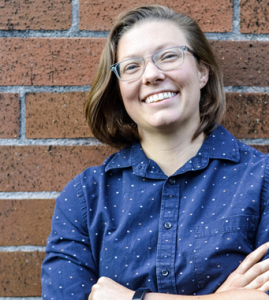
Brenda Taulbee graduated with an MFA in Creative Writing (Poetry) from San Diego State University in 2019. She now works at Savvy Agency as the Content Director, where she manages a small team of digital content writers in addition to her own creative production.
Brenda was first introduced to Digital Humanities through her friend Tina Lumbis (former DH Programs Assistant), and she spent much time in the DH Center (DHC), witnessing collaborative creativity at work. For her the spark was electronic literature, which introduced her to the idea that poetry is multidimensional, rather than fixed on the page. She started to experiment with her own writing in new, digital ways and DH@SDSU gave her the opportunity to teach digital storytelling to others.
Brenda exemplifies the success of DH@SDSU: how we support critical thinking through DH course curriculum, provide valuable insight into user-experience by project exposure, and advance professional skills through DH opportunities.
Read about how Brenda recognizes the impact of DH@SDSU in a brief Q&A between Brenda and Harmit Chima (DH@SDSU’s current Program Assistant).
DH@SDSU is a reminder that there’s always a new way to look at a problem, project, or idea. E-lit, in particular, is an exciting frontier for writing. It’s making literature more accessible, more engaging, more alive for modern readers.
What role did DH play in your education?
DH expanded my concept of what writing is and what it can be. Through electronic literature and digital tools, I watched storytelling come alive in unexpected and exciting ways. The ability to think about poetry (and language in general) as multidimensional rather than fixed on the page is thrilling.
Most fond moments with DH@SDSU?
Definitely Pam [Lach]’s hats 🙂 I spent a lot of time in the DHC my last year at SDSU, and I appreciated stepping into a space that was always buzzing with ideas. I always felt like I could walk into DHC with any concept or idea and there were people around me who could help bring it to life.
Has being a part of DH@SDSU impacted your career path?
Absolutely. DH@SDSU gave me the confidence I needed to step into a completely new career path as well as invaluable tools for thinking critically about how language exists and functions in the digital space. My time studying e-lit helped shape how I think about context, audience, and purpose when crafting and editing marketing content. And DH made me think about how to use digital tools creatively.
Are there any moments in your career where you have used useful skills acquired from DH@SDSU? If so, could you name one or two?
This is a fairly new career path for me, since I graduated in 2019. But I would say that I use the skills I acquired from DH@SDSU on a daily basis. The ability to think critically about how language and medium intersect has helped me push my team of writers outside of their comfort zone.
Through studying and crafting e-lit pieces, I’ve also gained valuable insight into user-experience (which is super trendy in the marketing space right now). As a storyteller, you’re writing for a specific person. The story needs to be built in a way that’s accessible to that reader, especially if it’s being told in a nontraditional format. The ability to put myself in the reader’s headspace translates really well to my current role in digital marketing.
DH@SDSU also gave me the language I need to talk about digital content creation in a meaningful way. The owners at Savy jokingly call me Professor Taulbee because I tend to speak “academic” to them when I’m breaking down our work conceptually.
How has DH@SDSU impacted your motivation and passions?
DH@SDSU is a reminder that there’s always a new way to look at a problem, project, or idea. E-lit, in particular, is an exciting frontier for writing. It’s making literature more accessible, more engaging, more alive for modern readers.
What sort of DH@SDSU projects have you been involved with? Have any of the skills acquired from these projects been significant?
I worked with DH@SDSU and ARC teaching e-lit and digital storytelling to high school students around San Diego. That experience was significant because it taught me how to communicate ideas with people at different experience levels. Up to that point, I’d spent a lot of time in the center talking to other folks in the academic space. Connecting high schoolers with these ideas, trying to inspire the same passion and excitement I felt was a practice in translation.
Is there any advice you could offer DH@SDSU students?
Stay excited, keep asking questions, and approach every project with a sense of wonder. Get involved as much as possible, because inspiration is everywhere. And don’t forget that “soft skills” like critical thinking and learning to communicate your ideas are just as valuable as learning to use actual digital tools.
